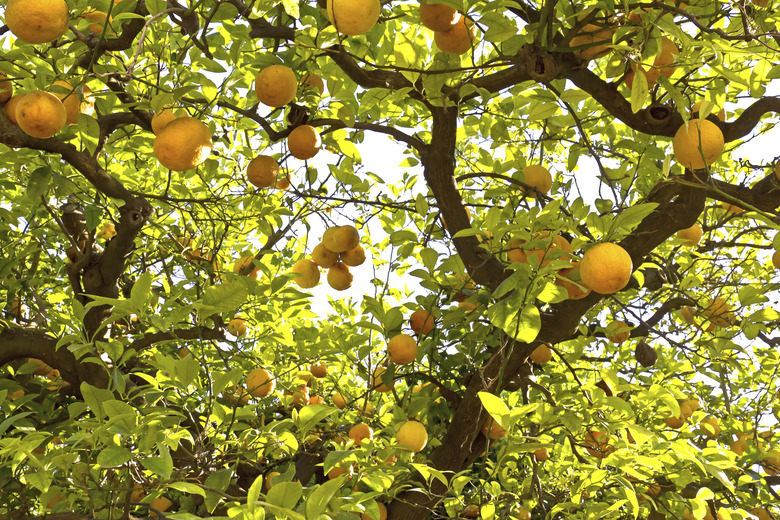The Life Cycle Of A Citrus Tree
Citrus trees (Citrus spp.), including Meyer lemon (Citrus x meyeri) and sweet oranges (Citrus x sinensis), both of which are hardy in U.S. Department of Agriculture plant hardiness zones 8 to 11, require a warm climate, but given the right growing conditions, they can reliably produce fruit for a half century or more.
Germination and Seedlings
The first stage in a citrus tree's life cycle starts when a seed germinates and sprouts into a seedling. A citrus seed requires warm soil and consistent moisture to trigger its emergence from dormancy, and the seed may take anywhere from two weeks to several months to germinate. It should be noted that many types of citrus grown from seed do not produce the same quality or type of fruit as the mother tree.
Germinating Citrus
Things Needed
- Citrus seeds
- Small pot or flat
- Half sand, half peat moss soil mixture
Step 1
Fill pot with soil mixture and plant seeds at a depth of twice the length of the seed.
Step 2
Water the soil mixture to saturate the soil, and then cover the pot with plastic wrap.
Step 3
Keep the pot in a room with a temperature of at least 70 degrees Fahrenheit and keep the soil consistently moist until the seed sprouts.
Step 4
Remove the plastic wrap after the seed sprouts and move the pot to a location that receives bright, indirect light.
Juvenile Phase
As the seedling grows into a young tree, it enters the juvenile phase of its development. During this phase, the tree does not flower or produce fruit, instead directing its energy into relatively fast vegetative growth. Juvenile trees also produce relatively vigorous root growth, and they may also be thornier than adult trees.
The juvenile phase of citrus trees grown from seed typically last between five and 13 years. This is much longer than the juvenile phase of many herbaceous plants, for which the phase is often one or two years. Other types of fruit trees, however, may have even longer juvenile phases of between 20 and 30 years.
To reduce the length of the juvenile phase, nurseries often propagate citrus trees by grafting cuttings from adult trees on to root stock. Trees propagated in this way typically enter the adult phase within three to six years. Grafting cuttings onto appropriate root stocks also assures you will get the same type and quality of fruit as the mother tree.
Adult Phase
After the juvenile phase, citrus trees pass through a transitional immature adult phase into a mature adult phase. During these adult phases, the trees are sexually mature and capable of producing flowers and fruit. Vegetative and root growth slows down, and the development of thorns is reduced.
Life Span
The tree remains in the mature adult phase until the end of its natural life span. Mature trees often produce fruit for more than 50 years, and the total life span of the tree may exceed 100 years. Citrus trees grown in the ground have a longer lifespan than those grown inside containers.
